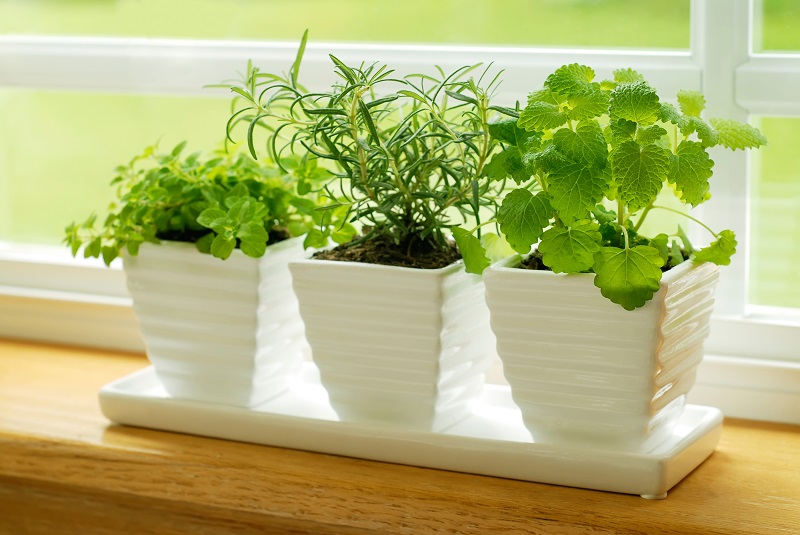
It’s always depressing to say goodbye to your garden at summer’s end. The easiest way to have a year-round garden is to cultivate herbs in planters.
Starting a Year-Round Herb Garden
If you plan to start seedlings indoors and overwinter the plants, you need a large window that gets the sun most of the day, a Florida room or sun room. Your herbs need light, warmth and TLC to survive winter.
The easiest herb to start and grow is basil. Basil seeds germinate in about a week. The soil should be barely moist to the touch. Misting seedlings with water twice a day prevents over-watering.
You can also start basil from a cutting. After the original plant’s stem gets woody, it’s not likely to last much longer. Using clean scissors washed in soap and water, cut the healthy, green branches at an angle, above joints. Put them in water in your sunniest window. When the white roots start to crowd the bottom of the glass, transplant the new plant into dirt and water it a little every other day. Full-grown basil plants can tolerate three or four days with no water.
Containers
Most gardeners use seedling trays when starting herbs because it makes transplanting seedlings easier. Just scoop the dirt and baby plants out of each section with the tip of a sharp trowel. Clay pots are best for all plants, especially new ones. Clay keeps the roots from getting overheated and dying.
Herbs to Grow Outside and Indoors
In addition to basil, some of the best herbs to overwinter are:
• Oregano
• Rosemary
• Sage
• Thyme
• Chives
• Parsley
Oregano is easy to root in water. Rosemary, sage and thyme cuttings must be rooted in potting soil and require humidity. Divide new growth from chive and parsley plants and transplant.
Regularly harvesting your plant during summer will keep it flourishing until fall. If your basil starts to flower, pinch or snip off the flower. Always use clean scissors, and clean them before using them on a different plant to avoid spreading plant diseases.
Wait until chives are around six inches tall before cutting so that they stay lush.
Do you have an abundance of fresh herbs? Dry the extra in separate paper bags. Punch several holes through each side of the bag with a pencil, make sure the herbs are dry, tape down the top of the bag and hang it in a dry, warm place in your house. Chives are difficult to dry. They develop a musty gray growth and aren’t usable.
Some herbs are mild when fresh while others are strong when fresh and lose flavor when dried.
Overwintering Herbs
Start your cuttings or divide plants while the weather is still mild to avoid temperature shock. Your herbs will require nurturing during the winter, may not produce as much and some may go into hibernation. This is normal. Your goal is to have a growing garden ready for next spring.
Things to Remember:
• Some herbs root in soil and others in water
• Use clay pots
• Move herbs inside and outside during mild weather
To learn more about herb gardens and keeping herbs over the winter, contact us.
